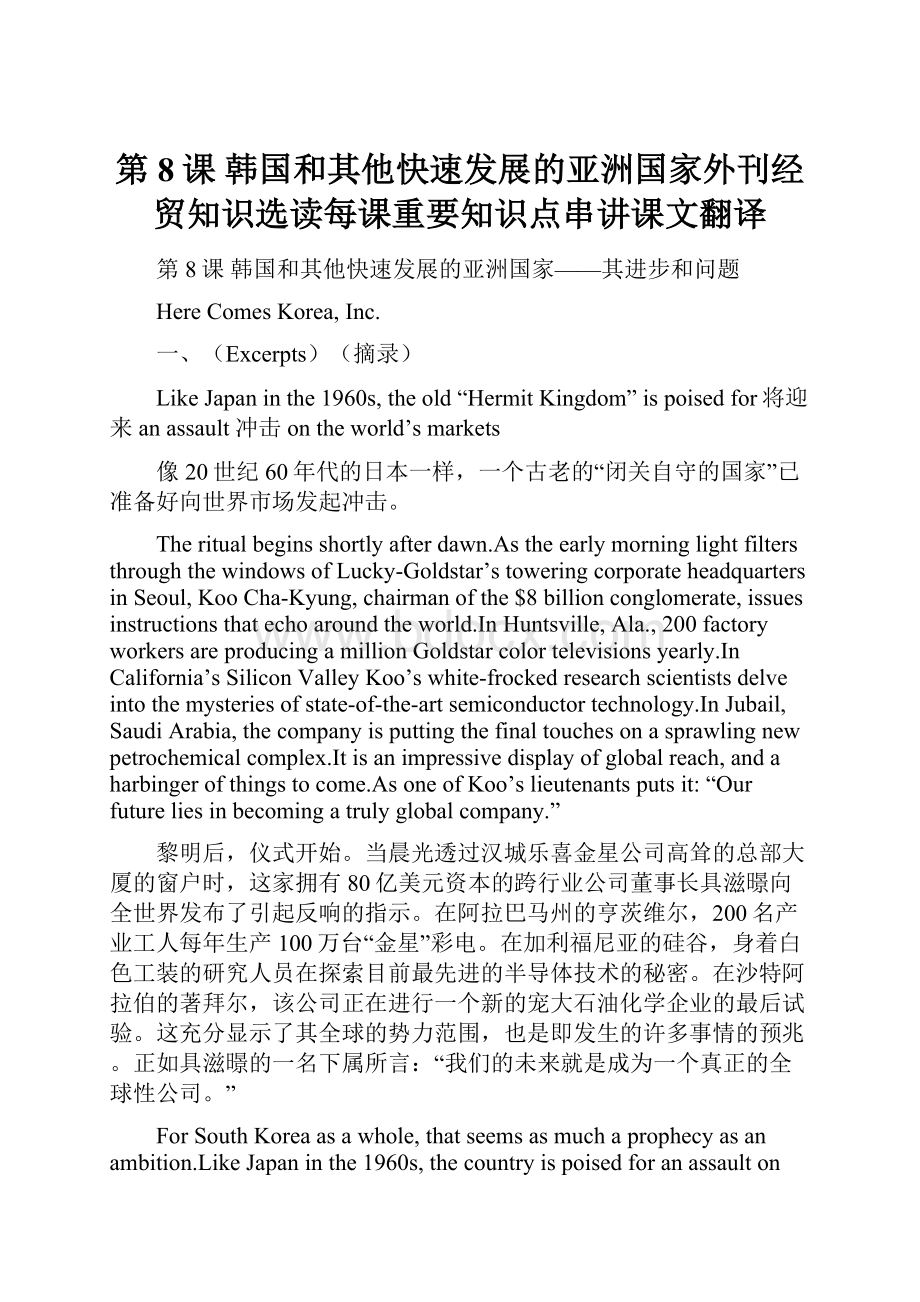第8课韩国和其他快速发展的亚洲国家外刊经贸知识选读每课重要知识点串讲课文翻译.docx
《第8课韩国和其他快速发展的亚洲国家外刊经贸知识选读每课重要知识点串讲课文翻译.docx》由会员分享,可在线阅读,更多相关《第8课韩国和其他快速发展的亚洲国家外刊经贸知识选读每课重要知识点串讲课文翻译.docx(23页珍藏版)》请在冰豆网上搜索。

第8课韩国和其他快速发展的亚洲国家外刊经贸知识选读每课重要知识点串讲课文翻译
第8课韩国和其他快速发展的亚洲国家——其进步和问题
HereComesKorea,Inc.
一、(Excerpts)(摘录)
LikeJapaninthe1960s,theold“HermitKingdom”ispoisedfor将迎来anassault冲击ontheworld’smarkets
像20世纪60年代的日本一样,一个古老的“闭关自守的国家”已准备好向世界市场发起冲击。
Theritualbeginsshortlyafterdawn.AstheearlymorninglightfiltersthroughthewindowsofLucky-Goldstar’stoweringcorporateheadquartersinSeoul,KooCha-Kyung,chairmanofthe$8billionconglomerate,issuesinstructionsthatechoaroundtheworld.InHuntsville,Ala.,200factoryworkersareproducingamillionGoldstarcolortelevisionsyearly.InCalifornia’sSiliconValleyKoo’swhite-frockedresearchscientistsdelveintothemysteriesofstate-of-the-artsemiconductortechnology.InJubail,SaudiArabia,thecompanyisputtingthefinaltouchesonasprawlingnewpetrochemicalcomplex.Itisanimpressivedisplayofglobalreach,andaharbingerofthingstocome.AsoneofKoo’slieutenantsputsit:
“Ourfutureliesinbecomingatrulyglobalcompany.”
黎明后,仪式开始。
当晨光透过汉城乐喜金星公司高耸的总部大厦的窗户时,这家拥有80亿美元资本的跨行业公司董事长具滋暻向全世界发布了引起反响的指示。
在阿拉巴马州的亨茨维尔,200名产业工人每年生产100万台“金星”彩电。
在加利福尼亚的硅谷,身着白色工装的研究人员在探索目前最先进的半导体技术的秘密。
在沙特阿拉伯的著拜尔,该公司正在进行一个新的宠大石油化学企业的最后试验。
这充分显示了其全球的势力范围,也是即发生的许多事情的预兆。
正如具滋暻的一名下属所言:
“我们的未来就是成为一个真正的全球性公司。
”
ForSouthKoreaasawhole,thatseemsasmuchaprophecyasanambition.LikeJapaninthe1960s,thecountryispoisedforanassaultontheworld’sexportmarkets.Itssurging$81billioneconomyischurningoutafloodofincreasinglysophisticatedproducts,fromshoes,toysandtelephonestovideorecordersandmicroprocessors.Korea’smightyconglomeratesdominateMiddleEastconstruction,andtheycommandkeysharesoftheworld’sshipbuilding,textileandsteelindustries.Theiraffiliates,jointventuresandsubsidiariesgirdletheglobe,stretchingfromAustralia,IndonesiaandIndiatoNorway,SpainandGabon,HyundaiandDaewoo,withannualsalesof$10billionand$6billionrespectively,arepushingintotheU.S.automarket,rivetingtheattentionofAmericanandJapanesemanufacturers.Anothercolossus,the$9billionSamsung,hasstartedmarketinga“super-tech”256Kcomputerchip—encouragingsomeKoreanstospeakconfidentlyofthedaywhentheywillbecometheworld’ssecondlargestmanufacturerofbasicelectroniccomponents,outstrippingAmericaandrunningjustbehindJapan.
对整个韩国来说,那似乎不仅是个预言,也是个理想;像20世纪60年代的日本一样,这个国家准备向世界出口市场发起攻击。
它迅速崛起的规模达810亿美元的经济体正大量生产越来越先进的产品,从鞋、玩具和电话到录像机和微处理器无所不包。
韩国实力雄厚的跨行业公司支配着中东地区的建筑业,并控制着世界造船业、纺织业和钢铁工业的主要份额。
这些公司的附属企业、合资公司和子公司遍布全球,从澳大利亚、印度尼西亚、印度到挪威、西班牙和加蓬都有;年销售额分别为100亿美元和60亿美元的现代公司和大宇公司正在进入美国的汽车市场,这引起了美国和日本厂商的注意。
另外一个大企业,年销售额90亿美元的三星公司,已开始推销一种“超高科”256K计算机芯片—这使一些韩国人自信他们有一天将超过美国,成为仅次于日本的世界上第二大基础电子元件生产国。
Might:
Korea,onceknownasthe“HermitKingdom,”isplainlyonthemove.Aswith“Japan,Inc.”beforeit,thenewlabel“Korea,Inc.”maybenomorethanatrendybuzzword.ButSouthKoreaaimstoforgejustsuchanationaleconomicmachine,usingthemightofitsestablishedgiantsbackedbycentralizedplannerswhocanmobilize-thecountry’sbanksandindustrialinfrastructure.TheheadydreamsofactuallyrivalingJapanmaynevercomewithinreach;Korea’seconomy,whilelargebyAsianstandards,isbarelyone-fifteenththesizeofitsislandneighbor.Anditfacesagantletofotherobstacles,rangingfromanunwieldybureaucracyandavolatilepoliticalclimatetoachronicshortageofinvestmentcapitalandheavycommitmentstomilitaryspending.Still,thecomparisonswithJapan,Inc.aremorethanemptyflattery;infact,theysignalKorea’sgatheringclout.
力量:
曾被称为“隐士王国”的韩国正在阔步前行。
可能“韩国公司”会像此前的“日本公司”一样仅仅是一个时髦词。
但韩国的目的就是利用其地位稳固的大企业的力量来建成强大的国家经济机器,而大企业又都是由那些能动员国家银行和工业基础设施的中央集权的计划者所支持的。
实际上那种可与日本媲美的梦想或许永远也无法实现;以亚洲的标准来衡量,韩国的经济规模不算小,但仅是其岛国邻居日本经济规模的十五分之一。
而且还面临着其他重重困难,从难操作的官僚机构和多变的政治气候到长期的投资资本短缺和大量的军备开支。
尽管如此,与“日本有限公司”相提并论并不是空洞的恭维话;事实上,这标志着韩国不断扩大的影响力。
ThosesignshavenotbeenlostontheWest.FromWashingtontoTokyo,BonntoRome,governmentsareeyingKorea’schallengewithunease.Justifiedornot,theviewisthattheKoreansareaggressivelytargetingWesternmarketsforanall-outexportblitz.Alreadytherearehintsofaprotectionistbacklash.Europeanmanufacturersshudderedas$4.1billionworthofKoreangoodsflowedintotheirhomemarketslastyear.AndintheUnitedStates,13antidumpingsuitswerebroughtagainstKoreanfirms.Thedoublingofcountry’stradedeficitwithSouthKorea—toaconspicuous,ifstillrelativelymodest,$3.5billion—touchedoffagroundswellofconcerninCongressandtheWhiteHouse.
西方世界并没有忽视这些迹象。
从华盛顿到东京,从波恩到罗马,各国政府都在不安地盯着韩国的挑战。
不管是真是假,韩国似乎正在虎视眈眈地瞄准西方市场,以开始其全面的出口闪电式行动。
目前已出现了保护主义强烈抵制的迹象。
去年,价值41亿美元的韩国商品涌入欧洲市场,欧洲厂商战栗了。
在美国有13起针对韩国公司的反倾销起诉。
美国和韩国之间的贸易赤字增加了1倍——达到35亿美元,虽然还算适度,但已经足够引起人们注意了—这使国会和白宫的担忧日益增长。
Notsurprisingly,nocountryismoreworriedthanJapan.FearfulthatrapidlymodernizingKoreanrivalwillintrudeonitsforeignanddomesticmarkets,JapanhasfoughttokeeptheKoreansfromappropriatingitstechnologies.Korea’sentryintotheglobalvideomarket,forinstance,hasbeendelayedforyearsbyanembargoenforcedbyJapaneselicensers.ButtheJapanesewillnotbeabletokeepalidontheirhigh-techknow-howforever.Soonerorlatertheywillbegintolosetheiredge,muchastheUnitedStatesdidagainstJapan.“Historyisrepeatingitself,”saysEjiYamashita,generalmanageroftheDaiwaSecuritiesResearchInstituteinTokyo.AddsanotherJapaneseexecutive:
“Thereisstilla10-yeargap(betweenoutcountries),butitisquicklyeroding.”
当然,没有哪个国家比日本更担忧了。
日本害怕迅速现代化的对手韩国会侵占其国内外市场,所以极力阻止韩国获得其先进技术。
例如由于日本技术拥有者禁止对韩国企业转让相关技术,韩国进入全球音像市场被推迟了好几年。
但日本不可能永远使其高科技保密,正如过去美国和日本的竞争一样,日本也迟早会失去其优势。
东京的大和证券研究所的总经理山下荣思说:
“历史总在重演.”另外一个日本企业高层也指出:
“我们两国之间还有十年的差距,但它正在一点点地消失。
”
Strategy:
SouthKorea’semergenceasaworld-classeconomicpowerhasbeenstartlinglyrapid.FourdecadesofJapanesecolonialrule,followedbythebloodyKoreanWar,leftthecountrypsychologicallyscarredandeconomicallybereft.In1961,whenGen.ParkChungHeeseizedpowerinamilitarycoup,yearlypercapitaincomehoveredatabare—bones$100.ParkcommittedKoreatoexportingitswayoutofpoverty,andhisstrategywasassimpleasitwaseffective:
showerthecountry’sfledgingconglomerateswithhugesubsidies,government-backedloansandofficialfavorsandturnthemintotheworld’ssuppliersofbargain-basementtextiles,footwearandlightindustrialgoods.
策略:
韩国以令人惊讶的速度成为世界级经济强国。
在经受日本40年的殖民统治和随后的残酷朝鲜战争之后,该国在心理上伤痕累累,经济上一贫如洗。
1961年,当朴正熙将军在一次军事政变中夺取政权时,其年人均收人一直在少得不能再少的100美元左右徘徊。
朴正熙决定要通过出口使韩国摆脱贫困,他的策略既简单又有效:
给本国新兴的跨行业公司以大量的补助金、政府担保的贷款和官方的优惠政策,使其成为世界上价格低廉的纺织品、鞋类和轻工业品的供应国。
Morerecently,KoreahasbenefitedfromsomeunabashedborrowingofJapanesebusinesspractices.AttheHanRyukElectronicsCo.ontheoutskirtsofSeoul,forexample,all350employeeswearuniforms,thecolorandstyledependingonthejob.Theplantrecentlyheldacompetitiontocomeupwithacompanysong,andwallplacardsexhortworkersto“ImproveQuality,”“BoostExports.”Andtruetotheirwhichmeetafterworkonceaweektodiscusswaystoimproveproductivity.
最近,韩国毫不掩饰地借用了日本企业的做法并从中受益。
例如在汉城郊区的韩六电子公司,350名员工都穿着制服,颜色和式样因工种不同而不同。
工厂近来又通过比赛选出了公司之歌;墙上的标语牌敦促工人“提高质量”,“促进出口”,并要求铭记“勤奋和忠实”的重要性。
而且,与日本公司一样,员工们被编为“质量小组”,每周在工作之余聚会一次,讨论提高生产率的途径。
Theresultshavebeendazzling.Fortwodecades,yearinandyearout,Koreahassizzledalongatan8percentannualgrowthrate.Exportshavesurgedfrom$119millionin1964to$29billionlastyear.Percapitaincome,now$2,000,couldreach$5,000bytheendofthecentury.Allthishasbeenaccompaniedbyanear-revolutionaryimprovementinlivingstandards.Koreaboastsaliteracyrateof95percent,astandardmetbyonlyafewofthemostadvancedWesternnations,andarecentpollshowedthatnearlytwo-thirdsofallKoreansprovincialcapitalofSeoulteemswithenergyandsophistication.Beyondanydoubt,Korea’sexpectationsforabetterlifearehighandrisingfast.
效果是非凡的。
连续20年,韩国的经济一直以8%的年增长率在增长;出口额已从1964年的1.19亿美元猛增到去年的290亿美元。
人均收人现在是2,000美元,到本世纪末可能会达到5,000美元。
所有这些都伴随着生活水平近乎革命性的提高。
韩国宣称其脱盲率已达到95%,这个标准只有少数最发达的西方国家才能达到;最近的一次民意测验显示,三分之二的韩国人认为他们自己属于中产阶级。
汉城这个曾带有不少乡村气的首都,如今却充满活力和繁荣。
毫无疑问,他们越来越期盼更好的生活,而且要求也越来越高。
IncomeGap:
Infulfillingthosehopes,however,Koreafacessomepotentiallydisruptiveproblems.Somearesocial.Foralltheprogress,deeppocketsofpovertyexistthroughoutthecountry.InSeoul,glisteninghigh-riseapartmenthousesjostlewithwarrensofslumhousing;inremoteruralcommunitiespeoplearestillekingoutsubsistencelivings.Asaresult,conspicuousconsumptionbyanouveaurichelitehasbecomearealsourceoffriction.IncontrasttoJapan,whichhasmanagedtospreaditspostwarwealthrelativelyevenly,Koreaisbesetbyawideningincomegapbetweenrichandpoor.Prosperityhasflowedmostreadilytothelargecities,andtothosewhofounded—orworkfor—thecountry’slargestindustrialcompanies.SmallbusinessmenandtheiremployeesarestillwaitingforabiggercutofKorea’snew-foundbonanza.
收入差距:
然而,在实现这些希望的过程中,韩国面临着一些严峻的问题,其中一些属于社会问题。
尽管取得了一些进步,但各处都存在贫困现象。
在汉城,闪闪发光的高楼大厦与破旧拥挤的贫民区毗邻;在偏远的乡村地区,人们仍在艰苦地维持勉强糊口的生活。
结果,新生暴发户奢侈的消费成了冲突的一个真正的根源。
日本设法使其战后的财富分配得较为均衡,相反,韩国却在为贫富之间日益扩大的收人差距困扰。
大城市最容易在经济上走向繁荣,还有那些创立了该国最大实业公司的人们或为此工作的人们也很富有。
而小商人及其雇员仍在等待着大范围的削减韩国新建立的财源。
分享韩国新得财源方面依然所得微薄。
Equallyunsettlinghasbeenthepoliticalpricepaidforeconomicprogress.Formuchofitspostwarhistory,SouthKoreahasbeengovernedbyauthoritarianfigureswhoseizedpowerbyforce.AndwhileKoreanstodayhavemoremoneyandmoreleisuretimethaneverbefore,theyarealsopressingforgreaterdemocraticfreedoms.PresidentChunDooHwanrecentlyeasedhuman-rightsrestrictionsandadoptedalessheavy-handedattitudetowardhispoliticalapposition.Hehasalsorepeatedhispledgetostepdownfromofficein1988,justbeforeSeoulhoststheOlympicGames.Butthesesignsofpoliticalliber